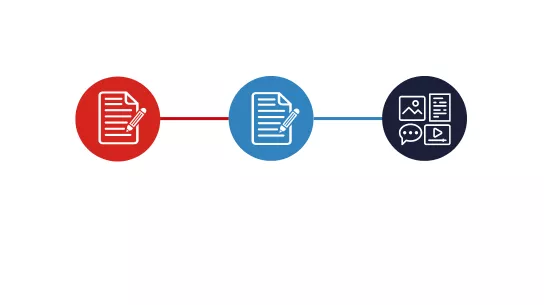Take this quick quiz to find out
We are searching for individuals who choose to use their lived experience of disabling barriers to make a difference. To create change.
You might have ambition to be a thought or a subject leader. To become prominent in your field or in your community. To participate in public life or in any activity where representation of disabled persons is disproportionately low. Whatever your specific plans, it’s likely that you, or others around you, see your current or future self as a role model, pioneer or leader. And that your future plans will help drive societal change and inclusion for all.
If you feel like that describes you and your plans, we are excited to meet you.

Eligibility info
Disability
You must have a diagnosis of one or more of the following:
- A learning difference (e.g. dyslexia, dyspraxia, or AD(H)D)
- A visual impairment uncorrected by glasses (e.g. blindness or partial sight)
- A hearing impairment (e.g. D/deafness or partial hearing)
- A physical impairment or challenges with mobility (e.g. climbing stairs or uneven surfaces), or dexterity (e.g. using a keyboard or laboratory equipment)
- A social, behavioural or communication impairment (e.g. an autistic spectrum condition or Tourette’s Syndrome)
- A long-term illness or health condition which may involve pain or cause fatigue, loss of concentration or breathing difficulties – including any effects from taking associated medication.
- Two or more impairments or conditions
If you experience a mental health condition, challenge, or disorder (e.g. anxiety or depression) you are only eligible to apply if you also have a diagnosis of one or more of the health conditions or impairments listed above.
Disability is defined differently within different contexts and by individual preference, and the impact of any disability can vary greatly, so we can’t provide an exhaustive list or reply to all queries about the eligibility of specific health conditions or impairments. If you have a diagnosis of a disability and you believe that you meet the inclusion criteria, then you should apply.
Disability
You must have a diagnosis of one or more of the following:
- A learning difference (e.g. dyslexia, dyspraxia, or AD(H)D)
- A visual impairment uncorrected by glasses (e.g. blindness or partial sight)
- A hearing impairment (e.g. D/deafness or partial hearing)
- A physical impairment or challenges with mobility (e.g. climbing stairs or uneven surfaces), or dexterity (e.g. using a keyboard or laboratory equipment)
- A social, behavioural or communication impairment (e.g. an autistic spectrum condition or Tourette’s Syndrome)
- A long-term illness or health condition which may involve pain or cause fatigue, loss of concentration or breathing difficulties – including any effects from taking associated medication.
- Two or more impairments or conditions
If you experience a mental health condition, challenge, or disorder (e.g. anxiety or depression) you are only eligible to apply if you also have a diagnosis of one or more of the health conditions or impairments listed above.
Disability is defined differently within different contexts and by individual preference, and the impact of any disability can vary greatly, so we can’t provide an exhaustive list or reply to all queries about the eligibility of specific health conditions or impairments. If you have a diagnosis of a disability and you believe that you meet the inclusion criteria, then you should apply.
About you
You must:
- be above 16 years of age
- have studied your undergraduate degree in the UK (if you are an international student), and/or have UK home fee status.
- be applying for your first master’s degree. We understand there may be disability-related reasons for starting a second master’s and so in these very exceptional circumstances we will accept an application for a second master’s. If you fall into this category, you will need to make a case for this in your application.
About you
You must:
- be above 16 years of age
- have studied your undergraduate degree in the UK (if you are an international student), and/or have UK home fee status.
- be applying for your first master’s degree. We understand there may be disability-related reasons for starting a second master’s and so in these very exceptional circumstances we will accept an application for a second master’s. If you fall into this category, you will need to make a case for this in your application.
Your course
Your course must:
- be at a university or higher education institution in the UK
- be a full master’s course (180 higher education credits) e.g. MA, MSc, MRes, MPhil, LLM, MBA
- start during the 2024/25 academic year (between July 2024 and September 2025)
- not be eligible for funding by your employer or through Access to Work (if applicable)
You must apply to your university before applying for a Snowdon Master’s Scholarship. You will need to show evidence of your course offer during the application process.
Your course
Your course must:
- be at a university or higher education institution in the UK
- be a full master’s course (180 higher education credits) e.g. MA, MSc, MRes, MPhil, LLM, MBA
- start during the 2024/25 academic year (between July 2024 and September 2025)
- not be eligible for funding by your employer or through Access to Work (if applicable)
You must apply to your university before applying for a Snowdon Master’s Scholarship. You will need to show evidence of your course offer during the application process.
FAQs
Can I apply for an undegraduate course/PhD/integrated master's?
You can’t apply for an undergraduate course, a PG Cert, PG Dip, PGCE or a PhD level course, or any other master’s level studies which do not result in a full master’s degree.
Integrated undergraduate courses where the master’s is the final year are not eligible, however you can apply for the first master’s year of an integrated postgraduate course.
Can my course be part-time, or taught online?
Your course can be full-time or part-time. If you study part-time and receive a scholarship, it will be split between the two years of your degree.
Your course can be taught in person, online, or as a hybrid of these.
I am an international student, can I apply?
You can apply if you have UK home fee status, or if you studied your undergraduate degree in the UK.
If you do not meet this criteria you are not able to apply for this award.
I have a mental health condition, can I apply?
We can’t accept applications from individuals who identify as having a mental health condition, challenge, or disorder (e.g. anxiety or depression) unless you also have a diagnosis of one or more of the health conditions or impairments below:
- A learning difference (e.g. dyslexia, dyspraxia, or AD(H)D)
- A visual impairment uncorrected by glasses (e.g. blindness or partial sight)
- A hearing impairment (e.g. D/deafness or partial hearing)
- A physical impairment or challenges with mobility (e.g. climbing stairs or uneven surfaces), or dexterity (e.g. using a keyboard or laboratory equipment)
- A social, behavioural or communication impairment (e.g. an autistic spectrum condition or Tourette’s Syndrome)
- A long-term illness or health condition which may involve pain or cause fatigue, loss of concentration or breathing difficulties – including any effects from taking associated medication.
- Two or more impairments or conditions
I have another question about eligibility
We cannot answer every question we receive about eligibility. Please make sure you have read through all the information on these pages, and take our eligibility quiz to find out if you can apply.

